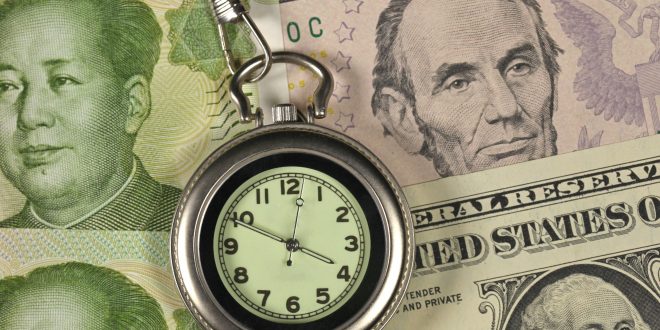The World Health Organization has called upon all countries around the world to cooperate in finding out the origin of the novel coronavirus, despite the Chinese rejection of the proposed scope for the second phase of the investigation, as the scope includes inspecting the hypothesis that the virus could have escaped from a Chinese laboratory.
The International Monetary Fund expects that the global economy could lose about $15 trillion from 2020 to 2024 due to the pandemic.
German Chancellor Angela Merkel has expressed concerns over the alarming rise in coronavirus cases in the country and stressed the importance of vaccinations, while France plans to allow only the vaccinated people to go in public spaces.
The European Central Bank has decided to keep its monetary policy unchanged, as expected leaving the main refinancing operations, the marginal lending facility, and the deposit facility rates unchanged at 0.00%, 0.25%, and -0.50%, respectively.
The European Central Bank has also announced new monetary policy targets that suggest extending support for a longer time to the Eurozone economy while boosting inflation, which has been low for nearly a decade below its 2% target.
ECB President Christine Lagarde said that the September forecast is more indicative of expectations and will influence the ECB, adding that exceeding the inflation target would be accidental rather than deliberate.
It is expected that the European Central Bank will not change the current pandemic emergency purchase program (PEPP) in its upcoming meeting in September, with a move likely to take place in October or even December.
Over the course of the week, the European Union has rejected a proposal by the United Kingdom to discuss a new post-Brexit trade deal. Similarly, the French government rejected the recent request by the United Kingdom to renegotiate the post-Brexit arrangement for Northern Ireland. The French Minister of Europe and Foreign Affairs, Clement Beaune, dismissed accusations of European dominance regarding the issue.
This comes as businesses in Northern Ireland are complaining the new deal is hurting trade exchange, with some believing it weakening ties with Britain. The British government told the parliament that it does not plan to maintain the current situation, seeking a new balance without the European bloc’s oversight.
It is possible that London could move unilaterally on the issue, but it remains to be seen how this might affect cooperation with the European Union, with the European Commission expressing no interest in renegotiation the protocol, calling for respecting international legal obligations.
Dollar
The U.S. Dollar registered modest gains against major peers but was mostly fluctuating over the course of the week, struggling for direction, rising for the second week in a row.
The Dollar Index that measures the greenback’s performance against a basket of six major international currencies, finished the week higher at 92.912, rising by about 0.25%.
The Dollar rose against the Sterling Pound by about 0.15% and by 0.29% to the Euro, with both the European and British currencies maintaining a downward trend for the second consecutive week.
Against the Japanese Yen, the Dollar snapped a two-week losing streak and rose by 0.43%, as the Yen show a diminished demand as all safe haven assets.
Gold
Gold prices snapped a four-week rising streak and recorded their first weekly decline, amid an improvement in risk appetite among investors, who seem to be less worried about reflation and slow recovery concerns. Losses were limited with concerns about the spread of the Delta variant of the coronavirus.
The yellow metal futures closed the week at $1,801.40 per ounce, losing $13.10 or 0.72% for the week, reaching its lowest closing level since July 8 and its biggest weekly drop since June 18.
Oil
Oil prices continued to rise on Friday for the fourth consecutive session, scoring their first weekly rise in four weeks, with investors shrugging off concerns about output policy and a slower than expected recovery from the coronavirus crisis.
Expectations of a relatively tight supply despite the forecasted demand recovery are providing support for oil levels.
Barclays Bank expects oil prices could rise to $100 a barrel over the coming months if the OPEC+ alliance is too slow to increase supply again, given the relatively inflexible response to non-OPEC+ supply.
The global benchmark Brent crude futures for September delivery closed at $74.10 a barrel, extending their weekly increase to 51 cents or 0.69%, while the West Texas Intermediate (WTI) futures finished at $72.07 per barrel, adding 0.71% for the week.
Treasury Yields
U.S. Treasury bond yields declined for the week, despite a relative rebound on Friday, with the benchmark 10-year Treasury bond rate going below 1.3% and reaching 1.276%.
As for the return on the 30-year Treasury bond, it reached 1.925%, while the two-year bond yield settled near 0.21%.
Stocks
Stock exchanges in Europe and the United States soared to new record highs, supported by the improvement in risk sentiment among investors, who shook off concerns about a slower than expected economic recovery due to the spread of the Delta variant of the coronavirus, and a huge persistent surge in inflation.
European stocks finished higher on Friday for the fourth consecutive session, extending their weekly gains and hitting a new all-time high, as the STOXX Europe 600 index closed at a record 461.51 points, adding 1.49% and registering its best weekly performance since May 7.
The New York Stock Exchange (NYSE) also finished the week higher, hitting new unprecedented record levels, supported by an improved Wall Street investors’ sentiment and risk appetite that improved on the back of positive earnings reports by major listed companies.
The Dow Jones Industrial Average finished at a record 35,061.55 points, exceeding the 35,000 level for the very first time, gaining 1.1% for the week.
The S&P 500 closed the week at 4,411.79 points, increasing by 2%.
Meanwhile, the Nasdaq Composite hit another record high of 14,836.99 points, registering a weekly rise of 2.8%, on the back of huge gains by major tech stocks.
 Noor Trends News, Technical Analysis, Educational Tools and Recommendations
Noor Trends News, Technical Analysis, Educational Tools and Recommendations





